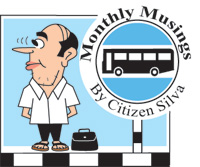Sunday Times 2
Patriotism is the last refuge
View(s):Nearly 250 years ago, on April 7, 1775 to be precise, the celebrated man of letters Samuel Johnson made the now famous pronouncement, “Patriotism is the last refuge of the scoundrel.” His intent was not to criticise patriotism –– which is the quality of being devoted to and vigorously supporting one’s own native land — but to ridicule those who at that time in his own country of England falsely pretended to be patriotic to distract and silence their opponents.
I was musing how relevant Johnson’s observation is when considering how modern day politicians in our own country try to utilise lofty ideals like patriotism and religion to distract the people’s attention from their scoundrel-like actions. When the going gets tough for them, these scoundrels try to pull the wool over the eyes of us gullible people by making a show of patriotism and morality, being shown on TV and in newspapers, participating in ceremonies at temples and churches — and trying to show us how religious they are.
I recall one of my colleagues once cynically saying to me as we observed some politicians participating in such a religious ceremony: “Pelak kattiya Pan Sil gaththata, Pan Sil rakinnay nam nae!” — meaning “Some people take the Five Precepts but do not follow the Five Precepts!”
Just consider all this latest fuss about declaring the Tripitika a National Treasure. A grand ceremony was held with the participation of a couple of thousand members of the Maha Sangha. Temples, Buddhist households and public institutions were asked to hoist the Buddhist flag and organise religious activities in parallel with the national ceremony at Aluvihare.
To me it appeared that the President had made good use of the official visit he made last November to mark the 40th anniversary of the establishment of diplomatic relations between South Korea and Sri Lanka to learn a trick or two.
In a Buddhist temple in Haeinsa in Korea’s South Gyeongsang Province, there exists a Korean collection of the Tripitaka carved onto 81,258 wooden printing blocks. Known as the Goryeo Tripitaka (Tripitaka Koreana) or Palman Daejanggyeong it was created in the 13th century and is the oldest and most comprehensive intact version of the Buddhist canon in Hanja script.
In 1962, the then government of South Korea designated the Tripitaka Koreana as a ‘National Treasure of South Korea’ – and in 2007 South Korea succeeded in getting the Tripitika Koraeana inscribed in the UNESCO Memory of the World Register.
So President Sirisena may have picked up a leaf from his South Korean hosts and come up with the idea of doing the same thing here.
Most of us in Sri Lanka know that the Tripitika was first written down here at Aluvihare sometime in the first century BCE, having been transmitted orally for about 500 years since the lifetime of the Buddha. Most of us are cognizant and proud of the role played by our nation in recording and preserving these sacred writings over the past two millennia.
So while we citizens already know and accept that the Tripitika is a national treasure, what purpose does it serve for the President to officially declare that the Tripitika is a National Treasure?
We Sri Lankans simply want the opportunity to get for ourselves and our families adequate food, shelter, clothing — and peace in our time. The President, of course, wants good publicity and to create the impression that he is a good Buddhist — though some of his actions may not go with the Fourth Precept Musavada veramani sikkhapadam samadiyami. (I undertake the precept of abstaining from false speech).
Over the past four years he has betrayed three key persons.
Firstly after that famous meal of hoppers in November 2014 he betrayed his leader President Mahinda Rajapakse.
Next he betrayed Ven. Sobhita Thera who was one of those instrumental in helping him become President in January 2015. Promising at Ven Sobitha’s funeral to abolish the Executive Presidency and be just a one term President, he has not only broken the first promise but has also made no secret of the fact that he covets the presidency for a second term.
The third example was when he indulged in the unconstitutional actions of sacking the legitimate prime minister and appointting a prime minister who did not have a mandate. Despite announcing a few years ago that he would never appoint Mahinda Prime Minister, he did exactly that last October. Announcing that he would not “re-appoint” Ranil Prime Minister even if all 225 MPs voted for him, he went on to do exactly that.
My readers may like to know an interesting fact about Roh Moo-hyun, the man who was President of South Korea in 2007 when UNESCO listed the Korean Tripitika in the Memory of the World Register. Despite being elected with high expectations in 2001, President Roh lost popularity and suffered the worst approval ratings ever recorded in South Korean political history. He did not contest the presidential election the following year — he retired at the end of his first term to run a farm and live as an ordinary citizen in his home town of Bongha Maeul.

